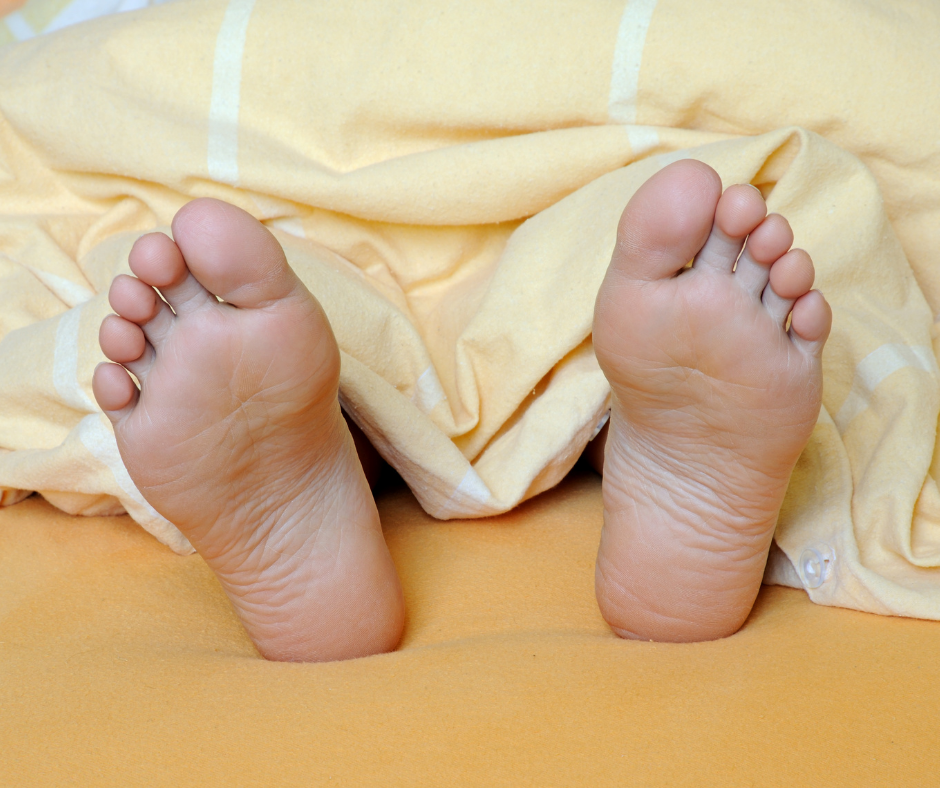
If you’ve been waking up with sore feet, heels or arches in the morning, this is for you. There’s a very specific kind of heel pain with the following three symptoms that you may relate to:
- Pain at the bottom of the heel that radiates into the arch
- Pain when standing up first thing in the morning, which tends to ease or go away as you take those first steps in the morning and stay walking
- Pain in the heel or arch when you stand up after having a rest or sitting down during the day
The name of this heel pain is plantar fasciitis, and it’s the #1 most common cause of heel pain that we see here in Auckland. Today, our podiatrists have shared all about this heel pain, why it happens, and how you can get rid of it today.
Morning foot pain: Plantar fasciitis
We know – terms like plantar fasciitis can sound confusing, but this one isn’t. Simply put, you have a connective tissue at the bottom of your foot called a fascia. Because of its location, it’s called the plantar fascia, meaning the fascia at the sole of the foot. As there is some damage or inflammation to the tissue, it is called plantar fasciitis.
What the plantar fascia actually is, is a thick band that runs from the bottom of your heel (where you’ll be feeling your pain) and spans out like a fan to connect into your toes. It supports your arch and works every time you take a step.
Why am I getting foot pain in the morning?
When this tissue is overloaded or strained, damage and pain occur. Specifically, the plantar fascia gets very small tears through its fibres. If the strain is high, it may even partially or completely tear. The reason behind the overloading and subsequent damage can vary greatly, and for our patients here in Auckland, tends to include:
- Taking on more physical activity or training – like a fitness challenge or doing a very big day of physical activity like a hike
- Foot biomechanics – the way the feet and legs function overloads the fascia when combined with other factors like a long day on the feet or poor footwear choices
- Unsupportive footwear, especially ones that have a flat, firm base – this is often pronounced when you move from regularly wearing supportive shoes to wearing less supportive shoes
- Hard surfaces – which affect many tradies at work
- Specific activities that overuse the fascia like climbing stairs
- Injury to the heel – like jumping down from a high surface, which injuries the fascia
I have been getting pain in the morning for a while. Will it last forever?
Absolutely not. Don’t worry – you will only continue to get pain while there is still damage to the fascia. Once we can help repair and heal the fascia, reducing the daily strain on it, the pain will also go and you can have your pain-free mornings back.
Will my morning foot pain go away on its own?
Not easily. The foot is a tricky area – unlike other parts of the body where you can immobilise it and just not use it for little while, you activate the fascia with every step you take, which may result in more damage occurring – or at least prevent it from getting better as it keeps getting irritated day after day. This is why plantar fasciitis should be professionally treated with the help of a podiatry team that have a strong focus on musculoskeletal injuries – like we do here.
How is plantar fasciitis heel pain treated?
Your treatment starts with a comprehensive assessment that looks at characteristics of your feet and legs, your gait, your injury and symptoms, evaluates the cause of the problem, and considers your lifestyle and goals.
Here at Perform Podiatry, we don’t want you wasting time (and money) trying methods that aren’t effective. We focus on getting you the best clinical outcomes as fast as possible using evidence-based medicine, with superior long-term results.
We start by alleviating your current painful symptoms and creating the right conditions for your fascia to heal. Next, we look at ways we can prevent your plantar fasciitis from returning in the future. Every treatment plan is different, but may include:
- Custom foot orthotics – to support the arch and reduce tension off the plantar fascia so it can heal instead of continuing being strained with every step
- Footwear check – to ensure your footwear isn’t contributing to your ongoing pain and inadvertently delaying your recovery
- Strapping or bracing as needed
- Strengthening weak muscles that may have contributed to the development of your heel pain
- Stretching tight muscles – not only to help stretch the fascia to reduce pain (where appropriate) but to also stretch other muscle groups that may have contributed to your heel pain, which often happens with tight calf muscles
- Dry needling – to release or activate trigger points to relieve pain or improve range of motion. This is usually done in the calf region
There are other causes of foot pain too
While plantar fasciitis is our #1 cause of morning foot pain, other conditions can create similar symptoms. This is why having a diagnosis is important – in our assessments we rule out other causes of heel pain like Abductor hallucis tendinopathy, fat pad syndrome and calcaneal stress fractures, to name a few. Once your diagnosis is confirmed, we will proceed with your care.
Proud to be trusted by thousands of people with foot pain every year
Our podiatry team here in Remuera is proud to be trusted by thousands with their foot and leg pain every year. If you’re waking up with foot pain, or it’s going all day, we’re here to help. Book your appointment online with us here or call us on 09 523 2333.
